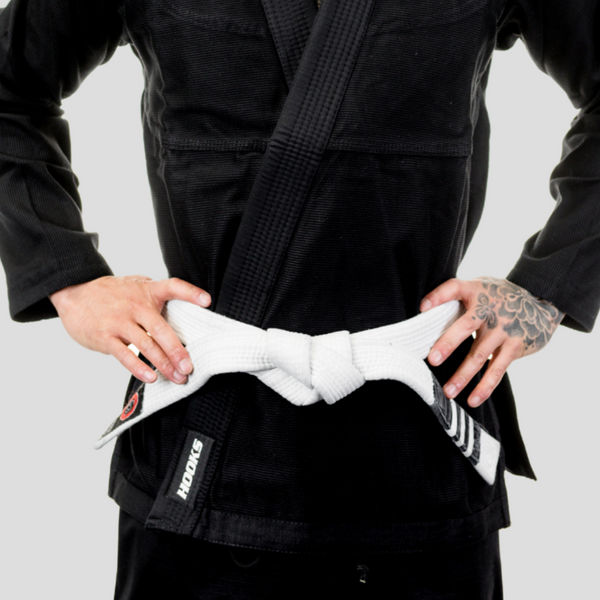Through the Ranks Chapter One: White Belt
Nov 21, 2024
Everyone starts out a white belt in Brazilian Jiu-Jitsu. It's so easy to forget that even our own coaches and the world-class grapplers we look up to, were once BJJ white belts. On top of that, no one masters a flying triangle in their first class – in fact, patience and persistence are two of the main ingredients that turn a fresh white belt into a competent grappler that climbs the ranks over time. Still, the first few months of training can bring up some big questions. How do we handle the daily losses, for example. Or where do we best invest our energy if we want to improve quickly? Read on if you're looking for answers to questions like these and to help you better understand what to expect from your time as a white belt.
The Learning Curve
Although the early beginnings in your jiu jitsu journey can feel pretty overwhelming, chances are you're doubling your knowledge every few sessions you attend. The simple fact that you start out not knowing anything means your learning curve will be steep. You quickly grasp movements like hip escapes, reverse shrimps and technical getups. You start understanding what it means to play guard and how to use your frames. Maybe you even pick up some submissions, learn the fundamentals of a triangle choke and drill how to transition to an armbar. At the same time, rolling can be intense. You're put in situations you don't recognise, and your lack of repetitions will make it incredibly difficult to apply the techniques you do know. Don't let this discourage you. Every time you train you're investing a little in your growth. And one thing is for sure – if you stick to it you'll eventually outgrow your white belt days.

A Humbling Experience
Remember that good things take time. You're not supposed to be a jiu-jitsu black belt yet because you haven't put in the time. It can be so humbling to realize that simply being athletic or a quick learner doesn't make you competent overnight. In fact, sometimes those that are naturally gifted struggle the most. They expect to skip the initial efforts and win in training rounds against less talented training partners, even if they've been around for much longer. This kind of attitude will most certainly hold you back. After all, a much skinnier person can out grapple the big powerlifter if they know more and understands how to use their game. Instead of getting angry and standing in your own way, remind yourself that growth comes over time and accept your defeats as part of the process. Leave the 'winning' for the competition mats and appreciate the training room for what it is: a place for you to learn BJJ.
Physical and Mental Toughness
Now that you've shifted your expectations you can embrace your own progress. Practice both patience and persistence in order to improve both physically and mentally. Many white belts feel like they lack cardio or strength when they first start, even if they run or regularly lift weights. But like many sports, jiu jitsu requires its very own type of fitness and the best way to acquire it is by actually training jiu jitsu.
Although it can be tempting to try and get fit before joining a jiu jitsu gym, let's face it – the best way is through it. Instead of waiting to feel ready, acknowledge the beauty in being an absolute beginner and soak it all up with an open mind. Before you know it, improved conditioning will be a byproduct of your technical progress on the mat.

Maintain consistency
Once you have had a few consistent weeks or months of training, you'll find your groove with your training partners and no longer feel utterly useless in your rolls. Keep that momentum going!
Even when things get busy at work, your family commitments are keeping you on a tight schedule or you simply don’t feel like going to class anymore – trust the process and keep that commitment to yourself. Practicing that discipline and consistency is what will get you to the next level in your jiu jitsu, and will help you in every aspect of your life. And... who knows, you might earn your blue belt on the way!
So keep your chin up and go train!



